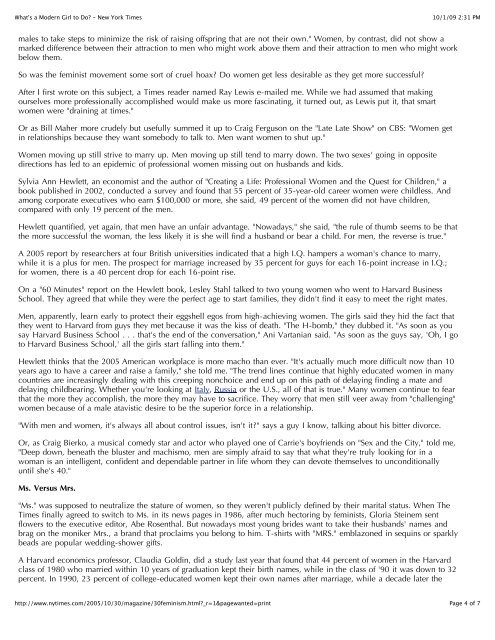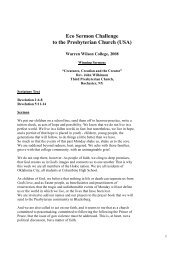What's a Modern Girl to Do? - Warren Wilson College
What's a Modern Girl to Do? - Warren Wilson College
What's a Modern Girl to Do? - Warren Wilson College
You also want an ePaper? Increase the reach of your titles
YUMPU automatically turns print PDFs into web optimized ePapers that Google loves.
<strong>What's</strong> a <strong>Modern</strong> <strong>Girl</strong> <strong>to</strong> <strong>Do</strong>? - New York Times<br />
10/1/09 2:31 PM<br />
males <strong>to</strong> take steps <strong>to</strong> minimize the risk of raising offspring that are not their own." Women, by contrast, did not show a<br />
marked difference between their attraction <strong>to</strong> men who might work above them and their attraction <strong>to</strong> men who might work<br />
below them.<br />
So was the feminist movement some sort of cruel hoax? <strong>Do</strong> women get less desirable as they get more successful?<br />
After I first wrote on this subject, a Times reader named Ray Lewis e-mailed me. While we had assumed that making<br />
ourselves more professionally accomplished would make us more fascinating, it turned out, as Lewis put it, that smart<br />
women were "draining at times."<br />
Or as Bill Maher more crudely but usefully summed it up <strong>to</strong> Craig Ferguson on the "Late Late Show" on CBS: "Women get<br />
in relationships because they want somebody <strong>to</strong> talk <strong>to</strong>. Men want women <strong>to</strong> shut up."<br />
Women moving up still strive <strong>to</strong> marry up. Men moving up still tend <strong>to</strong> marry down. The two sexes' going in opposite<br />
directions has led <strong>to</strong> an epidemic of professional women missing out on husbands and kids.<br />
Sylvia Ann Hewlett, an economist and the author of "Creating a Life: Professional Women and the Quest for Children," a<br />
book published in 2002, conducted a survey and found that 55 percent of 35-year-old career women were childless. And<br />
among corporate executives who earn $100,000 or more, she said, 49 percent of the women did not have children,<br />
compared with only 19 percent of the men.<br />
Hewlett quantified, yet again, that men have an unfair advantage. "Nowadays," she said, "the rule of thumb seems <strong>to</strong> be that<br />
the more successful the woman, the less likely it is she will find a husband or bear a child. For men, the reverse is true."<br />
A 2005 report by researchers at four British universities indicated that a high I.Q. hampers a woman's chance <strong>to</strong> marry,<br />
while it is a plus for men. The prospect for marriage increased by 35 percent for guys for each 16-point increase in I.Q.;<br />
for women, there is a 40 percent drop for each 16-point rise.<br />
On a "60 Minutes" report on the Hewlett book, Lesley Stahl talked <strong>to</strong> two young women who went <strong>to</strong> Harvard Business<br />
School. They agreed that while they were the perfect age <strong>to</strong> start families, they didn't find it easy <strong>to</strong> meet the right mates.<br />
Men, apparently, learn early <strong>to</strong> protect their eggshell egos from high-achieving women. The girls said they hid the fact that<br />
they went <strong>to</strong> Harvard from guys they met because it was the kiss of death. "The H-bomb," they dubbed it. "As soon as you<br />
say Harvard Business School . . . that's the end of the conversation," Ani Vartanian said. "As soon as the guys say, 'Oh, I go<br />
<strong>to</strong> Harvard Business School,' all the girls start falling in<strong>to</strong> them."<br />
Hewlett thinks that the 2005 American workplace is more macho than ever. "It's actually much more difficult now than 10<br />
years ago <strong>to</strong> have a career and raise a family," she <strong>to</strong>ld me. "The trend lines continue that highly educated women in many<br />
countries are increasingly dealing with this creeping nonchoice and end up on this path of delaying finding a mate and<br />
delaying childbearing. Whether you're looking at Italy, Russia or the U.S., all of that is true." Many women continue <strong>to</strong> fear<br />
that the more they accomplish, the more they may have <strong>to</strong> sacrifice. They worry that men still veer away from "challenging"<br />
women because of a male atavistic desire <strong>to</strong> be the superior force in a relationship.<br />
"With men and women, it's always all about control issues, isn't it?" says a guy I know, talking about his bitter divorce.<br />
Or, as Craig Bierko, a musical comedy star and ac<strong>to</strong>r who played one of Carrie's boyfriends on "Sex and the City," <strong>to</strong>ld me,<br />
"Deep down, beneath the bluster and machismo, men are simply afraid <strong>to</strong> say that what they're truly looking for in a<br />
woman is an intelligent, confident and dependable partner in life whom they can devote themselves <strong>to</strong> unconditionally<br />
until she's 40."<br />
Ms. Versus Mrs.<br />
"Ms." was supposed <strong>to</strong> neutralize the stature of women, so they weren't publicly defined by their marital status. When The<br />
Times finally agreed <strong>to</strong> switch <strong>to</strong> Ms. in its news pages in 1986, after much hec<strong>to</strong>ring by feminists, Gloria Steinem sent<br />
flowers <strong>to</strong> the executive edi<strong>to</strong>r, Abe Rosenthal. But nowadays most young brides want <strong>to</strong> take their husbands' names and<br />
brag on the moniker Mrs., a brand that proclaims you belong <strong>to</strong> him. T-shirts with "MRS." emblazoned in sequins or sparkly<br />
beads are popular wedding-shower gifts.<br />
A Harvard economics professor, Claudia Goldin, did a study last year that found that 44 percent of women in the Harvard<br />
class of 1980 who married within 10 years of graduation kept their birth names, while in the class of '90 it was down <strong>to</strong> 32<br />
percent. In 1990, 23 percent of college-educated women kept their own names after marriage, while a decade later the<br />
http://www.nytimes.com/2005/10/30/magazine/30feminism.html?_r=1&pagewanted=print<br />
Page 4 of 7

















